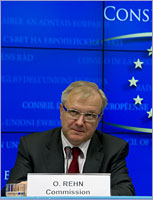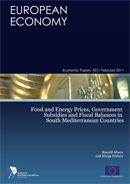 |
 |
If this email does not display properly, please click here |
|
|
 |
 |
 |
 |
Commission’s economic governance proposals move closer to adoption
The Commission’s proposals for stronger economic governance have moved one step closer towards adoption. At their meeting on 15 February, European finance ministers held a discussion on the package of legislative proposals intended to strengthen economic governance in the EU, and more specifically in the euro area. The Council's intention is to agree on a general approach on all six proposals at its meeting on 15 March, with a view to reaching an agreement with the European Parliament in June. Ministers also pursued implementation of the European Semester which the Commission had launched with its first Annual Growth Survey (AGS) of 12 January. Based on the Commission recommendations for 10 priority actions, ministers adopted conclusions on policy guidelines to Member States to tackle macroeconomic and fiscal challenges.
|
 |
 |

This Ecofin Council took place at a critical juncture in terms of overcoming the sovereign debt crisis. To reinforce confidence, we must agree on a convincing, comprehensive strategy to enhance growth, competitiveness and employment in March, without any further delay.
Olli Rehn, Commissioner for Economic and Monetary Affairs |
 |
 |
|
|
|
|
 |
|
 |
 |
 |
 |
 |
G20 finance ministers in Paris strike compromise to measure global economic imbalances
Meeting in Paris on 19 February, G20 finance ministers and central bank governors agreed on a two-step process and a set of indicators that will allow the G20 to focus policy action on persistently large macroeconomic imbalances. The following indicators will be used: public sector debt and fiscal deficits; private savings rates and private debt; and the external imbalance composed of the trade balance and net investment income flows and transfers, taking into consideration exchange rate, fiscal, monetary and other policies. Negotiations were at times tense, but in the end it was possible to overcome Chinese objections. The agreement paves the way for the next stage in the process, which is to draw up “indicative guidelines” (benchmarks) for each indicator at the next meeting of G20 ministers in Washington in mid-April. G20 ministers and governors also discussed a work programme for the discussion on reform of the international monetary system, priorities for future financial market reform, and the risks to the world economy posed by volatile commodity prices. |
 |
|
 |
 |
 |
|
 |
 |
 |
 |
 |
 |
Limited treaty change would allow establishment of a European stability mechanism
The European Commission has agreed that the Treaty should be amended before 2013 to allow for the establishment of a European stability mechanism to preserve the stability of the euro area. The Commission believes that the proposed amendment to Article 136 of the Treaty on the Functioning of the Union would not alter the competences of the European Union in any way. Therefore, the conditions are met for the change to be made through the simplified treaty amendment procedure. In his speech to the European Parliament of 15 February, Commission President Barroso said: “This decision is crucial for us to prove our determination to defend our common currency and guarantee financial stability in the face of some of the economic imbalances we've seen in some Member States – imbalances we need to remedy. This mechanism is essential in order to complete the Treaty framework." |
 |
|
 |
 |
 |
|
 |
 |
 |
 |
 |
 |
New video: Euro Taxi video interviews – Conference on the European Semester
The newly released video features short interviews recorded on the occasion of the Brussels conference of 12 January discussing the European Semester. This new annual cycle allows EU Member States to better coordinate macro-economic, budgetary and structural reform policies and mutually review their budget proposals before they are adopted at national levels. As the first major step towards more integrated EU economic governance, it started on the day of the conference when the Commission adopted its Annual Growth Survey (AGS). Against this background, the video captures ideas and opinions from inside and outside the conference. Key participants of the conference and citizens alike talk about their ideas what the European Semester is and what it will mean in the future. |
 |
|
 |
 |
 |
|
 |
 |
 |
 |
 |
 |
EU and Armenia sign memorandum on EUR 100 million financial assistance to Armenia
On 18 February, the EU signed a Memorandum of Understanding (MoU) with the
Republic of Armenia setting forth the economic policy conditions for the provision of macro financial assistance (MFA) to Armenia. The assistance, which is conditional upon the implementation of a number of economic measures, consists of a loan of up to EUR 65 million and a grant of up to EUR 35 million. It will support the adjustment programme agreed between Armenia and the International Monetary Fund to help the country through the global crisis. The first instalment, amounting to EUR 40 million, will be released after the ratification of the MoU and the loan and grant agreements by the Armenian Parliament, with the second instalment planned for autumn 2011.
|
 |
|
 |
 |
 |
|
 |
 |
 |
 |
 |
 |
Third review mission to Greece concludes conditions for fourth disbursement were broadly met
A joint European Commission/ECB/IMF mission met with the Greek authorities in Athens on 27 January–11 February 2011. The mission assessed compliance with the terms and conditions of the Third Review under the economic adjustment programme and updated conditionality for the next reviews. The programme's objectives remain intact. The objectives of the adjustment programme are to preserve financial stability and adequate liquidity in the banking sector, a front-loaded reduction in fiscal deficit to restore public debt sustainability, and a change to a growth model based on exports and investment to ensure growth and jobs and sustainability of the external accounts. Overall, the mission concluded that the conditions for the fourth disbursement were broadly met. In particular, the fiscal target for 2011 is within the interval of credible outcomes, and a wave of structural reforms is being prepared. The swift elaboration and approval of a medium-term fiscal strategy is imperative. There is no guarantee of success. More than ever, the next steps in the implementation of the programme will require the government's determination, political coordination and the consensus of the Greek society.
|
 |
|
 |
 |
 |
|
 |
 |
 |
 |
 |
 |
EU launches microfinance initiative to support small businesses
The European Commission launched the first EU microfinance project in the Netherlands jointly with the European Investment Fund (EIF) on 11 February. The project will allocate funds from several EU instruments to the Dutch microfinance institution Qredits. The funds are to facilitate the provision of microcredit of over EUR 20 million to small businesses or to people who have lost their jobs and want to start their own small businesses. The European Progress Microfinance Facility (Progress Microfinance) is a new initiative established with EUR 200 million of funding from the European Commission and the European Investment Bank Group. It aims to increase access to finance for micro-entrepreneurs, including the self-employed. Ninety-nine percent of start-ups in Europe are micro or small enterprises and one third of these are launched by people who are unemployed.
|
 |
|
 |
 |
 |
|
 |
 |
 |
 |
 
|
 |
Food and Energy Prices, Government Subsidies and Fiscal Balances in South Mediterranean Countries
This working paper focuses on the impact of soaring commodity prices, notably for food and energy, on the economies and public finances of Mediterranean neighbour countries of the EU. Just before the global crisis hit, soaring commodity prices pushed up inflation significantly in these countries, and impacted public finances, especially due to the cost of government food and fuel subsidies. Recently, commodity price pressures have re-emerged. The paper analyses recent developments in food inflation in Algeria, Egypt, Israel, Jordan, Lebanon, Morocco, the occupied Palestinian territories, Syria and Tunisia in comparison with other middle income economies. Longer-term, challenges for public finances remain as inflation rises on the back of higher global economic growth. Moreover, as recent events in Tunisia illustrate, these can have important political implications.
|
| Capital flows to converging European economies – from boom to drought and beyond, Occasional Paper 75 |
| ECFIN Economic Briefs 12/2011. Reshaping the Chinese growth model – a formidable challenge of the 12th five-year plan |
|
Upcoming: The EMU sovereign-debt crisis: Fundamentals, expectations and contagion. Economic Paper 436 |
|
Upcoming: Extension of the study on the diffusion of innovation in the internal market. Economic Paper 438 |
|
Upcoming: Fiscal policy and the labour market the effects of public sector employment and wages. Economic Paper 439 |
 |
|
 |
 |
|
 |
 |
 |
 |
 |
|
|
 |
 |
 |
| No calls available right now. |
|
|
  |
 |
 |
 |
  |
|
 |
 |
 |
|
 |
 |
Directorate-General for Economic and Financial Affairs |
|
|
|
 |
|